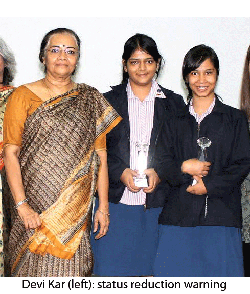 After passing the west bengal Clinical Establishments Registration, Regulation and Transparency Bill on March 17, which lays down rules for the state’s 300 private hospitals to end ‘extortion’, the Mamata Banerjee-led Trinamool Congress (TMC) government has resolved to frame a similar policy to regulate the tuition fees and donations allegedly demanded by private schools. A Bill on this issue has been framed and is scheduled to be passed in the next session of the legislative assembly in which the TMC has a clear majority of 84 seats.
After passing the west bengal Clinical Establishments Registration, Regulation and Transparency Bill on March 17, which lays down rules for the state’s 300 private hospitals to end ‘extortion’, the Mamata Banerjee-led Trinamool Congress (TMC) government has resolved to frame a similar policy to regulate the tuition fees and donations allegedly demanded by private schools. A Bill on this issue has been framed and is scheduled to be passed in the next session of the legislative assembly in which the TMC has a clear majority of 84 seats.
West Bengal (pop. 91 million) is one of the nine states including Rajasthan, Kerala and Delhi, where private school tuition fees will be increased by over 10 percent in the academic year 2017-18. The Bill will have provisions to “take action” against 1,000 CISCE and CBSE schools in West Bengal and a few affiliated with the state board, which have announced tuition fee hikes of more than 10 percent.
Protests against rising tuition fees of private independent schools have been gathering steam across the country in recent months. In December 2016, the Maharashtra legislative assembly passed a Bill enabling the state government to regulate the tuition fees of all private schools and colleges. In Punjab, the state government has imposed an 8 percent cap on tuition fee hikes; in Karnataka, the high court recently directed the government to issue a notification to frame a policy for regulating private schools’ tuition fees and donations.
On the other hand, private school promoters/managements claim to be flummoxed by the contradictory demands of middle class households for first world benchmarked education at third world prices. “To provide high quality education, we need to recruit, train and retain excellent teachers. Moreover, all parents expect excellent infrastructure, co-curricular and extensive sports facilities. Therefore in an inflationary economy, it’s impossible to keep tuition fees static. Parents who invite government interference — a Trojan horse — are being very foolish,” says the principal of a private unaided international school, who spoke to your correspondent on condition of anonymity.
The reality that India’s independent schools are experiencing severe operational costs pressure is confirmed by a 2015 Associated Chambers of Commerce and Industry of India (Assocham) study. The study reveals that private schools’ costs have risen faster than their incomes in the past decade — by 150 percent between 2005-15. According to the study, the cost of educating a child in Top 100 ranked private schools has risen from Rs.55,000 per year in 2005 to Rs.125,000 in 2015.
“In a diverse country like India, government has to accept variety and respect the management and operational autonomy of private education institutions. Government regulation of tuition fees of private independent schools could result in private schools being reduced to the status of government institutions,” warns Devi Kar, the highly-respected director of Kolkata’s Modern High School for Girls (estb.1952), ranked India’s #3 girls day school in the EW India School Rankings 2016.
Curiously, neither West Bengal’s government, academy nor the middle class voices the opinion that instead of focusing her attention on regulating private schools, chief minister Mamata Banerjee should direct the TMC government’s attention towards raising teaching-learning standards in the state’s 92,000 free-of-charge government schools. If she succeeds in doing that, private schools will wither away.
Baishali Mukherjee (Kolkata)























